If you’ve ever had an air conditioner, you know that it can be a real pain when it starts to leak freon. In this blog post, we’re going to show you how to fix freon leak in air conditioner quickly and easily. So, don’t waste any time – keep reading for instructions on how to get your AC up and running again!
Summary: If your air conditioner is leaking freon, there are a few things you can do to fix the problem. First, you’ll need to determine where the leak is coming from. Next, you’ll need to remove the damaged parts of the air conditioner and replace them with new ones. Finally, you’ll need to seal the newly installed parts with a freon sealant.
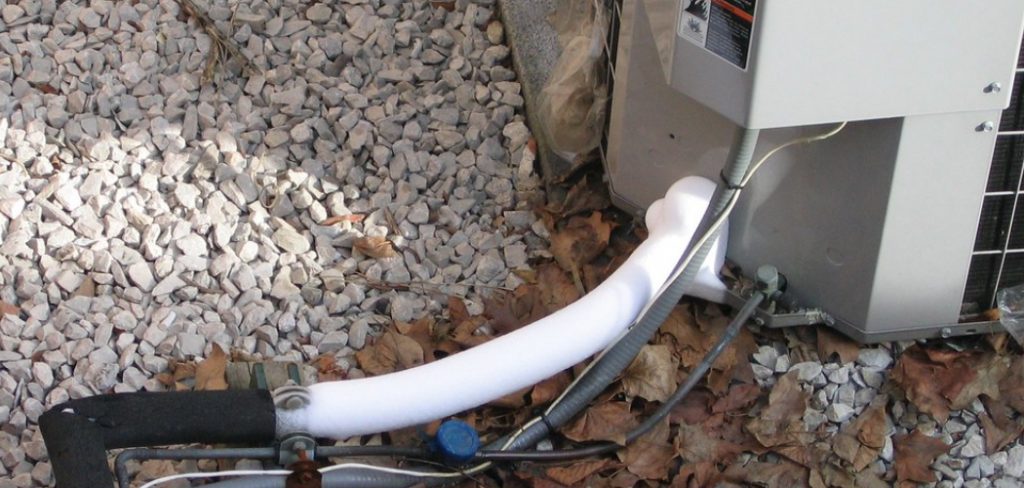
What Is a Freon Leak?
Freon is a type of gas used in refrigerators and air conditioners. It helps keep food and drinks cold by circulating the air inside the fridge. However, Freon can also be harmful to the environment. Freon gas is a greenhouse gas that traps heat from the sun inside the atmosphere. This can lead to global warming.
A Freon leak can be devastating to the environment. When this gas escapes into the atmosphere, it can cause extensive damage to the ozone layer. Freon leaks can occur in both home and industrial refrigerators and air conditioners. They can also occur in car air conditioners. When a Freon leak occurs, it is important to repair the leak as soon as possible to prevent further environmental damage.
Why It’s Important to Fix Freon Leak in Air Conditioner?
Freon is a chemical that helps to cool the air in your home. However, it can be harmful if it leaks out of your air conditioner. Freon can cause respiratory and other health issues, so it’s important to have any leaks fixed as soon as possible.
Not only does Freon harm your health, but it also contributes to global warming and harms the ozone layer. Therefore, it’s important to protect your health by ensuring that your air conditioner doesn’t have any Freon leaks. You’ll not only be protecting yourself, but also helping to protect the planet.
How to Fix Freon Leak in Air Conditioner Step by Step Guide
Step 1: Gather Necessary Tools and Materials
Before attempting to fix a Freon leak in your air conditioner, gather the necessary tools and materials, including:
- Electronic leak detector or ultraviolet (UV) leak detection kit
- Refrigerant scale
- Refrigerant recovery machine
- Vacuum pump
- HVAC gauges
- Safety goggles and gloves
- EPA-approved refrigerant (if applicable)
- Leak repair materials (solder, torch, or refrigerant leak sealant)
Step 2: Confirm the Presence of a Leak
Before addressing a suspected Freon leak, confirm its presence by checking for signs such as reduced cooling efficiency, ice build-up on the evaporator coil or refrigerant lines, or oily residue near the refrigerant lines or connections. Use an electronic leak detector or a UV leak detection kit to identify the specific location of the leak.
Step 3: Turn off the Power Supply
For safety purposes, turn off the power supply to the air conditioning unit before performing any repair work. This can be done by switching off the circuit breaker or disconnecting the power supply at the unit itself.
Step 4: Recover the Remaining Refrigerant
Connect the HVAC gauges to the air conditioning unit and attach the refrigerant recovery machine to the gauges. Recover the remaining refrigerant from the system following the manufacturer’s instructions and EPA guidelines. Be sure to wear safety goggles and gloves during this process to protect yourself from refrigerant exposure.
Step 5: Identify the Leak Location
With the refrigerant removed, use an electronic leak detector or UV leak detection kit to pinpoint the exact location of the Freon leak. Common leak locations include joints, connections, and valves, as well as the evaporator and condenser coils.
Step 6: Repair the Leak
Depending on the location and nature of the leak, choose the appropriate repair method. If the leak is located at a joint or connection, tighten the connection or replace any damaged parts. If the leak is in the refrigerant lines or coils, use a torch and solder to seal the leak or apply a refrigerant leak sealant as per the manufacturer’s instructions.
Step 7: Pressure Test the System
Once the leak has been repaired, perform a pressure test to ensure the system is properly sealed. Connect the HVAC gauges to the air conditioning unit and use dry nitrogen to pressurize the system to the manufacturer’s recommended pressure. Monitor the pressure for at least 15 minutes to ensure that it remains stable, indicating that the leak has been successfully repaired.
Step 8: Evacuate the System
After verifying that the leak has been repaired, use a vacuum pump to evacuate the air conditioning system. This process removes any remaining air, moisture, and contaminants from the system, ensuring optimal performance once the refrigerant is recharged. Follow the manufacturer’s instructions for evacuation times and vacuum levels.
Step 9: Recharge the Refrigerant
With the system evacuated, use the refrigerant scale and HVAC gauges to recharge the air conditioning unit with the appropriate type and amount of refrigerant, as specified by the manufacturer. Ensure that you are using EPA-approved refrigerant and following proper guidelines for handling and charging.
Step 10: Check the System for Proper Operation
After recharging the refrigerant, turn the power supply back on and test the air conditioning unit to ensure that it is operating properly and effectively cooling your space. Monitor the system for any signs of additional leaks or reduced cooling efficiency.
Step 11: Perform Regular Maintenance
To prevent future Freon leaks and maintain the efficiency of your air conditioning system, perform regular maintenance, including cleaning the evaporator and condenser coils, changing air filters, and inspecting refrigerant lines and connections for signs of wear or damage.
Step 12: Be Environmentally Responsible
Be aware of the environmental impact of refrigerants and follow all EPA guidelines when handling, recovering, and disposing of refrigerants. If you are unsure about any aspect of fixing a Freon leak, consult a licensed HVAC professional to ensure that the repair is completed safely and in accordance with environmental regulations.
Step 13: Educate Yourself on Alternative Refrigerants
As some refrigerants are being phased out due to their environmental impact, stay informed about alternative, more environmentally friendly refrigerants that may be compatible with your air conditioning system. Consult a licensed HVAC professional for advice on the best options for your specific unit.
Step 14: Inspect Your Air Conditioner Regularly
Regularly inspect your air conditioning system for signs of wear, damage, or potential leaks. Early detection and repair of leaks can prevent more significant issues and prolong the life of your air conditioner.
Step 15: Keep a Record of Repairs and Maintenance
Maintain a record of all repairs and maintenance performed on your air conditioning system, including dates, service providers, and any parts or materials used. This record can help you track the history of your system and identify any recurring issues that may need further attention.
Step 16: Schedule Annual Inspections
Schedule annual inspections and maintenance with a licensed HVAC professional to keep your air conditioning system operating at peak efficiency and to identify and address potential issues before they become significant problems.
Step 17: Upgrade Your Air Conditioner if Necessary
If your air conditioning system is aging or frequently experiencing issues such as Freon leaks, consider upgrading to a newer, more energy-efficient model. Modern air conditioners are designed with improved technology and materials that can reduce the likelihood of leaks and improve overall performance.
Step 18: Share Your Knowledge and Experience
Share your knowledge and experience with others who may be facing similar issues with their air conditioners. Educating others about proper maintenance and repair techniques can help promote more efficient and environmentally responsible use of air conditioning systems.
Step 19: Stay Informed on Industry Advances
Stay informed about advances in air conditioning technology, materials, and maintenance techniques. New products and methods are continually being developed, which can help make air conditioner maintenance and repair more accessible and effective. By staying up-to-date on the latest information, you can ensure that your air conditioning system remains in top condition for years to come.
Step 20: Practice Energy Efficiency
In addition to fixing Freon leaks, consider implementing other energy efficiency measures, such as using a programmable thermostat, sealing and insulating ductwork, and upgrading your home’s insulation. These measures can help reduce your energy consumption and save money on your utility bills while also reducing the environmental impact of your air conditioning system.
How to Detect a Freon Leak in Your Air Conditioner
Freon is a vital part of your air conditioner, and a leak can cause serious problems. Fortunately, a few telltale signs can help you detect a Freon leak. One of the most common is an increase in your energy bills. If your air conditioner is suddenly using more electricity than usual, it may be due to a Freon leak.
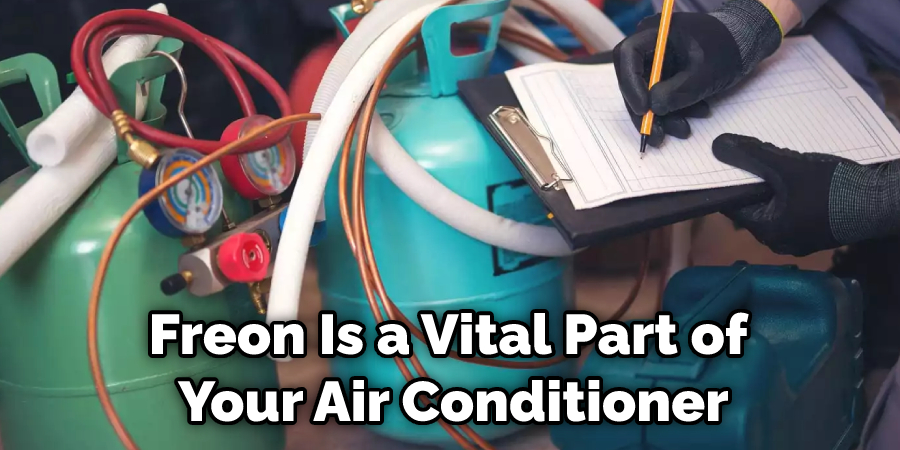
You may also notice a decline in efficiency as your air conditioner struggles to maintain the desired temperature. In some cases, you may even hear a hissing noise coming from the unit. If you suspect that your air conditioner has a Freon leak, it’s important to contact a qualified technician as soon as possible.
Only trained professionals have the tools and experience necessary to repair the problem safely.
What to do If You Have a Freon Leak in Your Air Conditioner
Every year, millions of Americans use air conditioners to stay cool during the summer months. Air conditioners rely on a freon refrigerant to remove heat from the air. If your air conditioner develops a Freon leak, it is important to take immediate action.
Freon is a harmful substance that can damage the ozone layer and contribute to global warming. Additionally, Freon leaks can be extremely dangerous to people and animals. If you suspect that your air conditioner has a Freon leak, contact a qualified repair technician immediately.
Do not attempt to repair the leak yourself, as this could result in serious injury. However, with proper care and maintenance, your air conditioner will continue providing cooling comfort for years.
What to Do if You Can’t Fix the Freon Leak Yourself
If your air conditioner is leaking Freon, it’s important to take action right away. Freon is a refrigerant that helps to cool the air inside your home. Without it, your air conditioner will be less effective and could eventually stop working altogether.
While you can purchase Freon from a local hardware store, leaving the repair to a professional is best. In most cases, Freon leaks are caused by issues with the air conditioner’s coils or compressor. Unless you have experience with AC repairs, it’s unlikely that you’ll be able to fix the problem yourself.
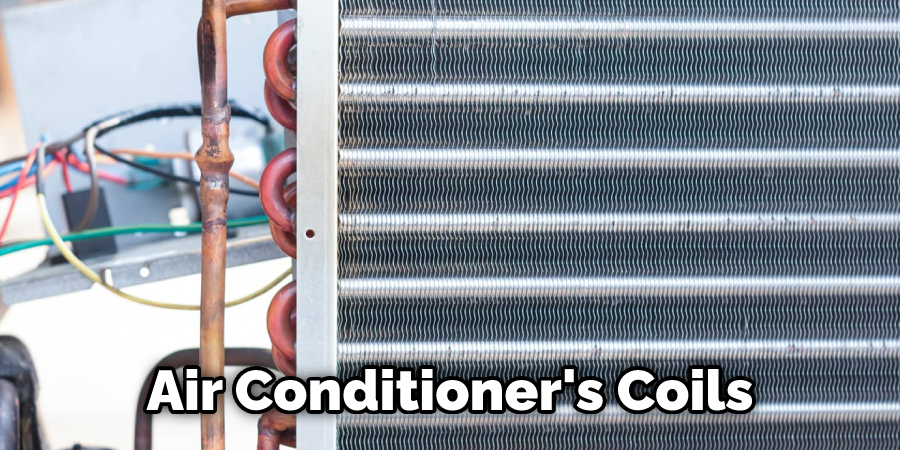
Instead, call a certified HVAC technician to come to take a look. They’ll be able to quickly identify the source of the leak and make the necessary repairs. Keep reading for more information about how to fix freon leak in air conditioner.
How to Prevent Freon Leaks in The Future
Freon leaks can be incredibly damaging to the environment and your bank balance. So nowadays, it’s more important than ever to be proactive about preventing these leaks. Here are a few tips on how to do just that:
- Regularly check your cooling system for any signs of damage or leaks. If you do find a leak, take action immediately to repair it.
- Ensure that your cooling system is properly insulated. This will help prevent Freon from escaping in the event of a leak.
- Make sure you have a good quality refrigerant recharge kit. This will allow you to quickly and easily recharge your system in the event of a leak.
By following these simple tips, you can help to prevent Freon leaks in the future.
How to Charge an Air Conditioner with Freon
Follow these steps to charge your air conditioner with Freon. First, make sure that the power to your unit is turned off. Next, locate the low-pressure service port and attach the charging hose. Next, be sure that the can of Freon is in an upright position. Then, open the valve on the can and allow the Freon to flow into the unit.
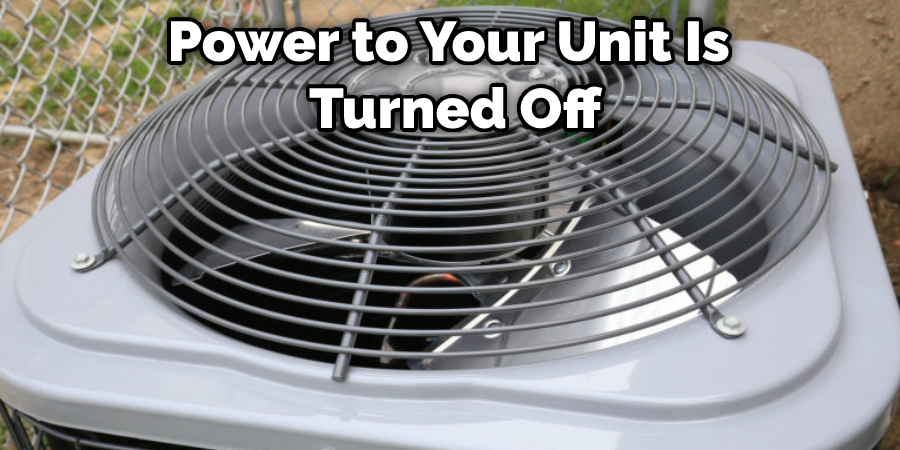
Once the desired level of pressure has been reached, close the valve on the can and remove the charging hose. Finally, turn on the power to your unit and check for leaks. If you notice any leaks, shut off the power to your unit and contact a qualified technician for assistance.
What Is the Average Cost to Repair a Freon Leak in An Air Conditioner?
When your air conditioner starts to leak, it can be an expensive repair. The cost to repair a Freon leak in an air conditioner can range anywhere from $200 to $600. The most common cause of a Freon leak is a hole in the air conditioner’s coils. Other causes include a cracked compressor, damaged condenser, or faulty valves.
If you’re not sure what’s causing your air conditioner to leak, it’s best to call a professional for an inspection. They’ll be able to pinpoint the source of the leak and give you an estimate for the repairs. However, the damage may be too extensive in some cases, and you may need to replace your air conditioner entirely.
However, repairs should be relatively affordable if the leak is small and isolated. Regardless of the cost, getting the leak fixed as soon as possible is important. Freon leaks can cause your energy bills to skyrocket and lead to more serious problems like compressor failure. So if you suspect a Freon leak, don’t wait – call a professional right away.
Is It Worth Fixing a Freon Leak?
Freon is an essential component of most air conditioners, and a leak can be a serious problem. Not only will it cause the unit to work less efficiently, but it can also damage other components. In some cases, a Freon leak can even lead to a total system failure. So, is it worth fixing a Freon leak? The answer depends on several factors.
First, the leak’s size will play a role in deciding whether or not it is worth repairing. A small leak may not be noticeable and may not cause any significant problems. However, a large leak can cause major damage and may require a complete system replacement.
The location of the leak is also important. If the leak is in an accessible location, then it may be possible to make a repair without too much difficulty. However, if the leak is in a difficult-to-reach spot, then it may be more expensive and time-consuming to fix.
Ultimately, the decision of whether or not to repair a Freon leak depends on many different factors. But if you are facing a Freon leak, it is important to consult with a qualified technician to assess the situation and find the best solution for your needs.
Frequently Asked Question
How Much Does It Cost to Fix a Freon Leak in Air Conditioner?
The cost of repairing a freon leak in an air conditioner varies depending on the severity of the leak and the type of AC unit. However, on average, the cost ranges from $200 to $600.
What Happens When Freon Leaks from Air Conditioner?
When the Freon leaks from the air conditioner, it will cause the AC unit to stop working. The Freon will escape, and eventually, it will get very cold in your home. If you have an older AC unit, it may not be able to handle the extra load when the Freon starts leaking, which could lead to a breakdown.
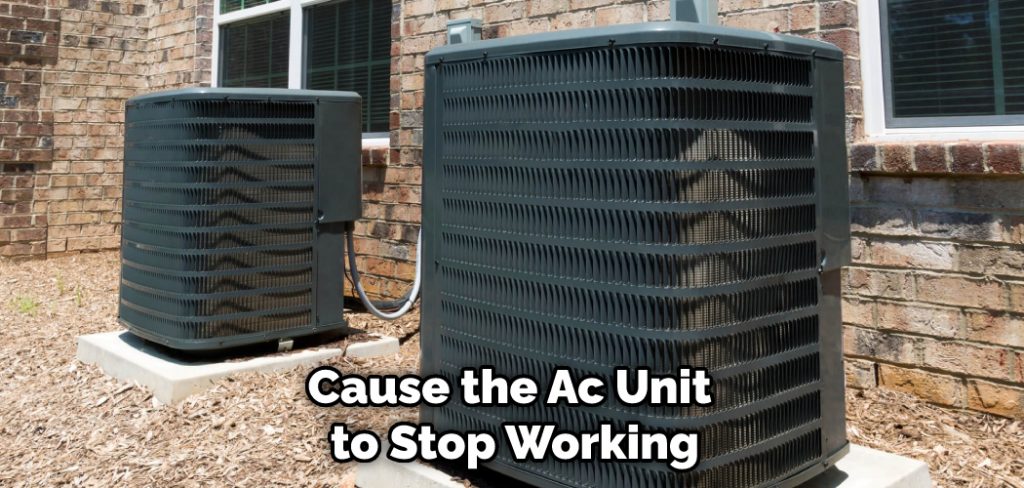
Can a Freon Leak Be Repaired?
Yes, a freon leak can be repaired, but it is not a simple process. First, the entire AC unit must be disassembled to find and fix the leak. If you are not comfortable doing this yourself, it is best to call a professional.
Conclusion
You have now learned how to fix freon leak in air conditioner. It is not as difficult as it may seem, and by following the steps we have outlined, you should be able to do it yourself. However, remember always to take caution when working with refrigerants, and if you are unsure about any step, please consult a professional. Have you fixed your own AC unit before? Let us know in the comments below!
